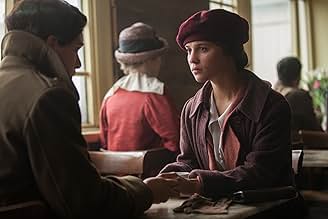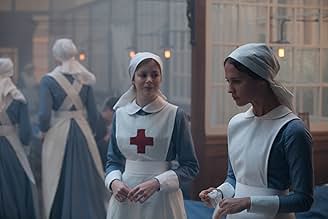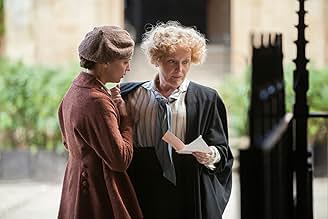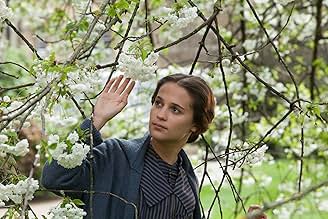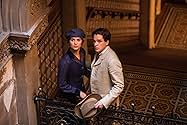VALUTAZIONE IMDb
7,2/10
31.357
LA TUA VALUTAZIONE
Una donna britannica ricorda la gioventù durante la prima guerra mondiale: una storia d'amore, la futilità della guerra e come dare un senso ai tempi più brutti.Una donna britannica ricorda la gioventù durante la prima guerra mondiale: una storia d'amore, la futilità della guerra e come dare un senso ai tempi più brutti.Una donna britannica ricorda la gioventù durante la prima guerra mondiale: una storia d'amore, la futilità della guerra e come dare un senso ai tempi più brutti.
- Regia
- Sceneggiatura
- Star
- Premi
- 5 vittorie e 7 candidature totali
Recensioni in evidenza
'Testament Of Youth' is a BBC film.
The film opens with a maffick, but with one young woman being rather subdued, even dazed. Then in a clever scene, there is a Col. Blimp- style swimming scene.
We are introduced to Vera Brittain, living in provincial comfort in Buxton Derbyshire, and struggling against social convention. She and her young male friends, all on the threshold of adulthood, are looking to the future. It is the summer of 1914 and the era is caught well and authentically.
Love is in the air and as our story develops we get some nice Michael Corleone-style 'Sicilian' courting. In a small part, Joanne Scanlan plays the chaperon Aunt Belle. She delivers to the part the same depth that she did when playing Mrs Catherine Dickens in last year's 'The Invisible Woman'. Played initially for laughs, the chaperon takes a much deeper and more human role as Summer moves into Autumn. There is a station scene, much more dramatic than that in the recent 'The Imitation Game', because the trains are going in a different direction.
Vera Brittain herself wrote of critics who doubted the authenticity of her account. Who are we, to measure the authenticity and depth of feeling of young lovers? This was their love, not ours! The reality of WWI, of course, can be easily measured and recounted.
The film gets progressively darker as the war intrudes into the story. The darkest scenes of all are set in France. These scenes are grim and gritty, muddy and bloody. There are many poignant scenes of love and war. Vera Brittain's male companions are played well by a strong cast. The central character of Roland Leighton is well played by Kit Harington, Here however, his romantic side is much more subdued, than that in his role in last year's 'Pompeii', where he featured in what was arguably the most romantic kiss scene of all time. Appropriately, Colin Morgan who has previously played the role of Merlin, here adds some magic, in what is perhaps the most poignant scene in this film. Perhaps the most sinister-looking figure in the film, is the innocent-faced-looking telegram-boy, played by Xavier Atkins. A small but scary part.
Pre-war Imperial Britain changed to the post-war era of Vera Brittain. The pre-war campaign for votes for women failed. The war forced women to do jobs previously done by men, to take up new roles and new responsibilities. Thus the post-war clamour for women's equality could no longer be ignored, and instead change started. The life and literature of Vera Brittain was an inspiration for the next generation, not the least being her daughter, the politician Shirley Williams. Vera Brittain's 'Testament' is now a recognized part of British culture and history. It is a long time since I read her book, but it seems to me that this film authentically captures the story in the book.
WWI was a seminal event. It changed the lives of a generation. it was a dominant theme in thinking in the inter-war period. To understand positions taken before and during WWII, we need to understand the context in which these positions were adopted.
In four short years British history was changed forever. So too for the world. This true story authentically captures the period and the resultant changes. 9/10.
The film opens with a maffick, but with one young woman being rather subdued, even dazed. Then in a clever scene, there is a Col. Blimp- style swimming scene.
We are introduced to Vera Brittain, living in provincial comfort in Buxton Derbyshire, and struggling against social convention. She and her young male friends, all on the threshold of adulthood, are looking to the future. It is the summer of 1914 and the era is caught well and authentically.
Love is in the air and as our story develops we get some nice Michael Corleone-style 'Sicilian' courting. In a small part, Joanne Scanlan plays the chaperon Aunt Belle. She delivers to the part the same depth that she did when playing Mrs Catherine Dickens in last year's 'The Invisible Woman'. Played initially for laughs, the chaperon takes a much deeper and more human role as Summer moves into Autumn. There is a station scene, much more dramatic than that in the recent 'The Imitation Game', because the trains are going in a different direction.
Vera Brittain herself wrote of critics who doubted the authenticity of her account. Who are we, to measure the authenticity and depth of feeling of young lovers? This was their love, not ours! The reality of WWI, of course, can be easily measured and recounted.
The film gets progressively darker as the war intrudes into the story. The darkest scenes of all are set in France. These scenes are grim and gritty, muddy and bloody. There are many poignant scenes of love and war. Vera Brittain's male companions are played well by a strong cast. The central character of Roland Leighton is well played by Kit Harington, Here however, his romantic side is much more subdued, than that in his role in last year's 'Pompeii', where he featured in what was arguably the most romantic kiss scene of all time. Appropriately, Colin Morgan who has previously played the role of Merlin, here adds some magic, in what is perhaps the most poignant scene in this film. Perhaps the most sinister-looking figure in the film, is the innocent-faced-looking telegram-boy, played by Xavier Atkins. A small but scary part.
Pre-war Imperial Britain changed to the post-war era of Vera Brittain. The pre-war campaign for votes for women failed. The war forced women to do jobs previously done by men, to take up new roles and new responsibilities. Thus the post-war clamour for women's equality could no longer be ignored, and instead change started. The life and literature of Vera Brittain was an inspiration for the next generation, not the least being her daughter, the politician Shirley Williams. Vera Brittain's 'Testament' is now a recognized part of British culture and history. It is a long time since I read her book, but it seems to me that this film authentically captures the story in the book.
WWI was a seminal event. It changed the lives of a generation. it was a dominant theme in thinking in the inter-war period. To understand positions taken before and during WWII, we need to understand the context in which these positions were adopted.
In four short years British history was changed forever. So too for the world. This true story authentically captures the period and the resultant changes. 9/10.
I first read "Testament of Youth" during university and was captivated by the emotionally moving real-life story of love and loss during war. The memoir spurred me on to read more about Vera Brittain, particularly during the World War I period that is the setting of "Testament of Youth." Having read her diary "Chronicle of Youth" and "Letters from a Lost Generation" long before watching this film, I had formed a strong attachment to Vera Brittain almost as if she was a personal friend. Reading her words, it is very easy for anyone, particularly a young, studious person to relate to her and the blossoming romance she describes between herself and her first love, Roland Leighton.
As such, I had extremely high expectations for this film, and was skeptical that Alicia Vikander and Kit Harington would be "my" Vera and Roland--I had such a fixed idea of them in my head. Fortunately Alicia and Kit's performances met my expectations. They had wonderful chemistry and the relationship as portrayed captured the essence of Vera and Roland: the intelligent, witty banter, sweet/innocent flirtatiousness, passion and angst. This relationship is at the heart of the memoir and is the driving force for much of what occurs during and after its commencement, so it was very important for this relationship to be portrayed accurately and to be emotionally moving for the audience, which it certainly was for me.
Supporting characters played by Taron Egerton (Edward) and Colin Morgan (Victor) were also wonderfully portrayed, which was a relief as the relationships with her brother and friend are extremely important in the memoir as well, and just as emotionally moving as the romance between Vera and Roland. As far as the other aspects of the film are concerned, the stirring scenes at the hospital where Vera volunteers as a nurse are gripping and faithfully portray the tumultuous wartime experiences that Vera describes in her memoir.
The highlight for me was the poetry of Roland which is interwoven during key moments in the film. This is a lovely element to the story that I found very touching and it provides a beautiful, emotional backdrop for key scenes.
I really hope this film spurs those who haven't read the memoir/have never heard of Vera Brittain to go on and read "Testament of Youth." The book certainly lingered in my mind for quite some time after I had first read it, and the film likewise recaptured those feelings for me.
As such, I had extremely high expectations for this film, and was skeptical that Alicia Vikander and Kit Harington would be "my" Vera and Roland--I had such a fixed idea of them in my head. Fortunately Alicia and Kit's performances met my expectations. They had wonderful chemistry and the relationship as portrayed captured the essence of Vera and Roland: the intelligent, witty banter, sweet/innocent flirtatiousness, passion and angst. This relationship is at the heart of the memoir and is the driving force for much of what occurs during and after its commencement, so it was very important for this relationship to be portrayed accurately and to be emotionally moving for the audience, which it certainly was for me.
Supporting characters played by Taron Egerton (Edward) and Colin Morgan (Victor) were also wonderfully portrayed, which was a relief as the relationships with her brother and friend are extremely important in the memoir as well, and just as emotionally moving as the romance between Vera and Roland. As far as the other aspects of the film are concerned, the stirring scenes at the hospital where Vera volunteers as a nurse are gripping and faithfully portray the tumultuous wartime experiences that Vera describes in her memoir.
The highlight for me was the poetry of Roland which is interwoven during key moments in the film. This is a lovely element to the story that I found very touching and it provides a beautiful, emotional backdrop for key scenes.
I really hope this film spurs those who haven't read the memoir/have never heard of Vera Brittain to go on and read "Testament of Youth." The book certainly lingered in my mind for quite some time after I had first read it, and the film likewise recaptured those feelings for me.
Vikander's assured performance really saves this film from being just another solemn costume drama, and it's largely thanks to her that the passion that inspired Vera Brittain's antiwar classic still shows through despite a sometimes rushed and perfunctory screenplay. Kit Harington ("Game of Thrones") is suitably intense as Vera's fiancé, Roland Leighton (didn't recognize John Snow at first in his new guise as beardless nature poet).
The camera may seem to dwell too much on idyllic country scenes and beautiful vistas at the expense of plot and character, though that does help to heighten the contrast between Vera's privileged but restricted prewar life and the new life of purpose and endless horror that awaits her at a field hospital in France. The camera's used most effectively when the two worlds collide-to illustrate Roland's poem addressed to the corpse of a German soldier found lying in a patch of wildflowers, most of all in the panorama of a boundless field of dead and dying men surrounding the hospital after a "big push" (which echoes the famous crane shot after the Battle of Atlanta in "Gone with the Wind"). I'll let the nitpickers figure out if the Leightons' house on the South Coast really did have a magnificent view of what looks like the White Cliffs of Dover, but the stormy shoreline makes the perfect backdrop for a scene in which Roland returns angry and shellshocked from the front
The basic storyline-Vera's service in France and her romance with Roland Leighton-is skillfully dramatized and very moving; her struggle with the conventions of Georgian family life is somewhat less involving, one exception being an ironic episode in which she's summoned back from the front to deal with a family "crisis," only to find that her mother's gotten sick and has fallen behind with the housework
The much-praised '79 series with Cheryl Campbell only seems to be available on VHS and Region 2 DVD; I wouldn't hesitate in recommending this gorgeous and affecting new version as an alternative.
The camera may seem to dwell too much on idyllic country scenes and beautiful vistas at the expense of plot and character, though that does help to heighten the contrast between Vera's privileged but restricted prewar life and the new life of purpose and endless horror that awaits her at a field hospital in France. The camera's used most effectively when the two worlds collide-to illustrate Roland's poem addressed to the corpse of a German soldier found lying in a patch of wildflowers, most of all in the panorama of a boundless field of dead and dying men surrounding the hospital after a "big push" (which echoes the famous crane shot after the Battle of Atlanta in "Gone with the Wind"). I'll let the nitpickers figure out if the Leightons' house on the South Coast really did have a magnificent view of what looks like the White Cliffs of Dover, but the stormy shoreline makes the perfect backdrop for a scene in which Roland returns angry and shellshocked from the front
The basic storyline-Vera's service in France and her romance with Roland Leighton-is skillfully dramatized and very moving; her struggle with the conventions of Georgian family life is somewhat less involving, one exception being an ironic episode in which she's summoned back from the front to deal with a family "crisis," only to find that her mother's gotten sick and has fallen behind with the housework
The much-praised '79 series with Cheryl Campbell only seems to be available on VHS and Region 2 DVD; I wouldn't hesitate in recommending this gorgeous and affecting new version as an alternative.
The centenary of the outbreak of what was at the time called The Great War, and came later to be known as The First World War, led to an outpouring of commemorative and cultural events. This explains the timing of "Testament Of Youth" which in fact is based on the famous first instalment of the memoirs of Vera Brittain (1893-1970) which was published as long ago as 1933 and is still in print. It is both a tale of tragic loss as young, idealistic men volunteer for the slaughter fields of France and Belgium and an account of an intelligent young woman's efforts to obtain a university education and make her independent way in the world.
There is a fine ensemble cast of established and new British actors, but the central role is the subject of a surprise and bold piece of casting as the Swedish actress Alicia Vikander plays the quintessentially British Brittain. However, Vikander gives a luminous performance and she is clearly destined for a very successful career. There is a sense of authenticity in having a female scriptwriter Juliette Towhidi to turn Brittain's memoir into a film and the whole thing is beautifully shot with stunning scenery plus period dress and transport.
There is a scene in "Testament Of Youth" which borrows directly from an iconic shot in the classic movie "Gone With The Wind": in both works, an overhead camera pulls back as the central female character walks through a field of dead and dying men revealing ever-larger numbers of bodies.
There is a fine ensemble cast of established and new British actors, but the central role is the subject of a surprise and bold piece of casting as the Swedish actress Alicia Vikander plays the quintessentially British Brittain. However, Vikander gives a luminous performance and she is clearly destined for a very successful career. There is a sense of authenticity in having a female scriptwriter Juliette Towhidi to turn Brittain's memoir into a film and the whole thing is beautifully shot with stunning scenery plus period dress and transport.
There is a scene in "Testament Of Youth" which borrows directly from an iconic shot in the classic movie "Gone With The Wind": in both works, an overhead camera pulls back as the central female character walks through a field of dead and dying men revealing ever-larger numbers of bodies.
I remember being given this book as a set text for an English A-Level examination over 30 years ago and am aware that there was a prestigious BBC production of it also several years back but this is the first dramatisation I've seen of Vera Brittain's novel documenting her own experiences in that golden age of post-Edwardian pre WW1 England when for coming-of-age birthdays you got given a piano from your father. That's if you were a girl of course, her more musically gifted brother conversely gets what she would have wanted, a scholarship at Oxford although on the other hand he is also at the the prime age to be called up for what he and most everyone else (but not their knowing father) believes will be a short, heroic and clean war which of course it turned out not to be (apart from the heroic part).
Young Vera is headstrong, not only about wanting to make her own way in a man's world (female emancipation was still years away), but later about making her own contribution to the war effort by enrolling as a nurse while her lover, brother and other male friends are fighting in the trenches. Told wholly from her point of view, it's an entertaining if not enthralling watch, beautifully shot and well acted if somehow just lacking some extra pathos to really capture the hellish undertow of the War to end all Wars.
Alicia Vikander is appealing as the vaguely tomboyish, intellectual Vera. In those days, it would appear, the golden youth had to be chaperoned everywhere by a usually imposing maiden aunt figure and make their feelings about each other known by writing and sending poems as the film strives to contrast the idyllic pre-war days of carefree swimming and carousing with the bleakness and destruction of war itself. For me, I didn't feel the contrast quite sharply enough and my abiding memories of the film are of the big family house and the dreaming spires of Oxford rather than the hell of the makeshift military hospitals and muddy and bloody trenches on the front line.
The best shot for me was when I perhaps detected a tribute to all-time great movie "Gone With The Wind" as Vera goes Scarlett-like amongst the wounded and dying, searching for her wounded brother where the camera ascends into a sweeping dolly shot showing the full extent of the number of the casualties, just like Vincent Fleming's rightly famous take all those years ago.
The supporting actors are picked from the familiar directory of experienced British character actors, notably Miranda Richardson and Emily Watson, while the young actors in the leads, all of them unfamiliar to me, perform with aplomb.
There is a great true-life story to be told here and this film does so respectfully and responsibly, if just a little too carefully at times.
Young Vera is headstrong, not only about wanting to make her own way in a man's world (female emancipation was still years away), but later about making her own contribution to the war effort by enrolling as a nurse while her lover, brother and other male friends are fighting in the trenches. Told wholly from her point of view, it's an entertaining if not enthralling watch, beautifully shot and well acted if somehow just lacking some extra pathos to really capture the hellish undertow of the War to end all Wars.
Alicia Vikander is appealing as the vaguely tomboyish, intellectual Vera. In those days, it would appear, the golden youth had to be chaperoned everywhere by a usually imposing maiden aunt figure and make their feelings about each other known by writing and sending poems as the film strives to contrast the idyllic pre-war days of carefree swimming and carousing with the bleakness and destruction of war itself. For me, I didn't feel the contrast quite sharply enough and my abiding memories of the film are of the big family house and the dreaming spires of Oxford rather than the hell of the makeshift military hospitals and muddy and bloody trenches on the front line.
The best shot for me was when I perhaps detected a tribute to all-time great movie "Gone With The Wind" as Vera goes Scarlett-like amongst the wounded and dying, searching for her wounded brother where the camera ascends into a sweeping dolly shot showing the full extent of the number of the casualties, just like Vincent Fleming's rightly famous take all those years ago.
The supporting actors are picked from the familiar directory of experienced British character actors, notably Miranda Richardson and Emily Watson, while the young actors in the leads, all of them unfamiliar to me, perform with aplomb.
There is a great true-life story to be told here and this film does so respectfully and responsibly, if just a little too carefully at times.
Lo sapevi?
- QuizSaoirse Ronan was originally cast as Vera Brittain but she dropped out due to scheduling conflicts. Alicia Vikander replaced her.
- BlooperAs Roland and Vera meet in late 1914 before he leaves for France, Aunt Belle notices that Roland is sick and she talks about how influenza is ripping through the troops and it's in all the newspapers "Spanish Influenza they call it." The earliest known case of what would only later be called the Spanish flu was in March of 1918--and reports of the plague were zealously suppressed in the press of the belligerent nations for fear that it damaged morale. The only reason the disease, which actually was first documented in Kansas, was named "Spanish Flu", was because Spain was neutral in the war and the Spanish papers were free to report cases, giving the wrong impression elsewhere that Spain was hit first and harder by the disease.
- Citazioni
Roland Leighton: Down the long white road we walked together. Down between the grey hills and the heather. You seemed all brown and soft, just like linnet. Your errant hair had shadowed sunbeams in it. And there shone all April in your eyes.
- Curiosità sui creditiDuring the opening credits, World War I guns can be heard in the background.
- ConnessioniFeatured in Film '72: Episodio #44.1 (2015)
- Colonne sonoreSilver Threads Among the Gold
Written by H.P. Danks & Eben E. Rexford
Performed by John McCormack
Source: Library and Archives
Canada/Silver Threads Among the Gold
1922/AMICUS 31399658
I più visti
Accedi per valutare e creare un elenco di titoli salvati per ottenere consigli personalizzati
- How long is Testament of Youth?Powered by Alexa
Dettagli
- Data di uscita
- Paesi di origine
- Siti ufficiali
- Lingue
- Celebre anche come
- Testament of Youth
- Luoghi delle riprese
- Aziende produttrici
- Vedi altri crediti dell’azienda su IMDbPro
Botteghino
- Lordo Stati Uniti e Canada
- 1.822.250 USD
- Fine settimana di apertura Stati Uniti e Canada
- 53.000 USD
- 7 giu 2015
- Lordo in tutto il mondo
- 5.851.758 USD
- Tempo di esecuzione2 ore 9 minuti
- Colore
- Mix di suoni
- Proporzioni
- 2.39 : 1
Contribuisci a questa pagina
Suggerisci una modifica o aggiungi i contenuti mancanti

Divario superiore
By what name was Generazione perduta (2014) officially released in India in Hindi?
Rispondi







